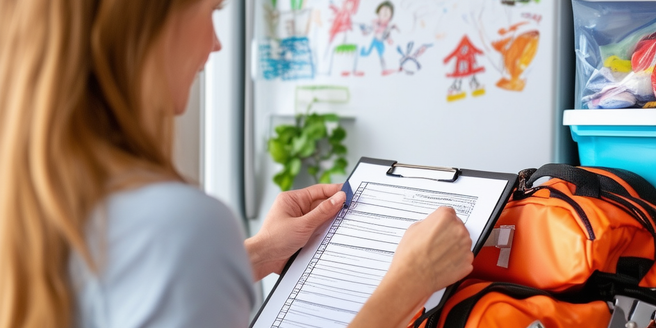
1. Understanding Emergency Risks and Scenarios
Single parents need to be acutely aware of potential emergency situations that could affect their family. Identifying risks specific to your region, such as natural disasters like earthquakes or floods, can help in planning effectively. Additionally, consider other scenarios like house fires or medical emergencies. Updating your emergency supplies kit is also crucial to being prepared. It is also essential to involve your children in these discussions to ensure they know what to do in case of an emergency. By understanding these risks, you can tailor your emergency plan to address the most pertinent threats. Regularly update yourself on local emergency alerts and stay informed about the specific hazards your family might face.
2. Building a Comprehensive Emergency Kit
A well-stocked emergency kit is essential for any family, but even more so for single parents. Gather essential supplies such as water, non-perishable food, first aid items, and necessary medications. Ensure you have enough supplies to last at least 72 hours. Include important documents, cash, and a battery-powered radio. Additionally, consider packing extra clothing and blankets for warmth. Depending on your children’s needs, add items like diapers, formula, or comfort toys. Having a plan and discussing it with your children can provide additional peace of mind. It’s also wise to have a checklist and regularly update your kit to ensure all items are functional and not expired. This preparedness can significantly ease the strain during an actual emergency.
3. Developing a Family Communication Plan
Clear communication is crucial during emergencies. Develop a plan that includes contact information for all family members, emergency services, and local shelters. It is important to keep this information updated regularly. Additionally, consider having a list of essential supplies and first-aid items readily available. Ensure that all supplies are checked and replenished as needed. Teach your children how to use this information in case they need to make an emergency call. Establish a designated meeting place if your family gets separated. Make sure everyone knows the plan and practice it periodically. A well-rehearsed communication plan can provide peace of mind and ensure that everyone knows what to do and where to go in case of an emergency.
4. Ensuring Financial Preparedness
Financial stability is a critical aspect of emergency preparedness. Start by saving an emergency fund that could cover at least three to six months of expenses. Ensure that you have insurance coverage for your home, health, and belongings. Reviewing your insurance needs with a professional can also provide valuable insights. It’s equally important to have a diversified investment portfolio. It’s also wise to review and update your insurance policies periodically. Keep important financial documents in a safe, easily accessible place. Consider setting up automatic savings plans to build your emergency fund gradually. Budgeting for emergencies can reduce stress and ensure that you have the resources needed to handle unexpected situations without compromising your family’s financial security.
5. Involving Children in Emergency Planning
Involving your children in emergency planning can empower them and reduce their anxiety. Teach them basic safety skills and what to do in various scenarios. Make it a positive and educational experience by turning it into a game or an engaging activity. Show them where emergency supplies are kept and explain their uses. Additionally, discuss different types of emergencies they might encounter and how to respond. Ensure they know how to contact emergency services using phones or other communication devices. Practice evacuation drills together so they know what to expect. By involving your children, you can help them understand the importance of preparedness and ensure they feel confident and capable in an emergency situation.
